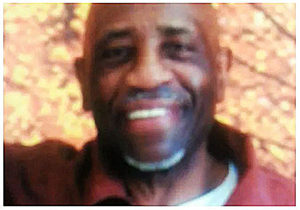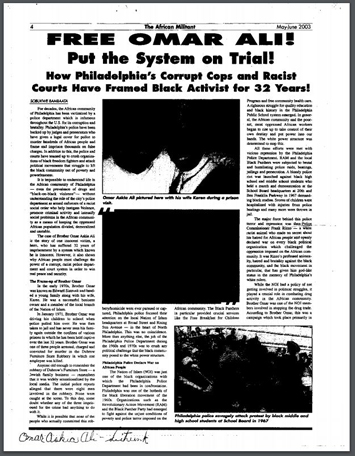The long test of faith of Omar Askia Ali
By Michael Z. Muhammad -Contributing Writer- | Last updated: Oct 12, 2016 - 1:03:56 PMWhat's your opinion on this article?

|
PHILADELPHIA—Edward X. Sistrunk, now known as Omar Askia Ali, was active in the Nation of Islam in the 1960s and 1970s as the movement pursued its mission of the complete spiritual, economic, social and political resurrection of the Black community.
Family members say he has served 45 years in prison for a crime he did not commit and accuse the authorities of fabricating evidence that was presented to an all-White jury.

|
His advocates are his family members. They are fighting to gain his freedom by educating the community about his plight and soliciting badly needed support.
According to wife Karen Ali, the family has hired an attorney that specializes in appeals, Shannon K. McDonald. “Although the family resides in different cities we are one in fighting to have Omar’s conviction overturned,” she told The Final Call.
While taking his children to the Muhammad University of Islam, he was pulled over by the Philadelphia police and ordered to take his children home as he was being taken downtown for questioning. That was in 1971 and Mr. Ali fell into a deep dark hole and was all but forgotten. He was accused of homicide and arson in the Dubrow Furniture Store heist. The case at the time was sensational as six Black men allegedly robbed the store owned by a well off Jewish businessman. During the robbery a fire was set and a maintenance man sadly lost his life. Omar Ali and another man were charged with the crime and sentenced to life in prison. He has languished there for nearly five decades. No forensic evidence was gleaned from the crime scene. He was identified through an old mug shot.
According to Mark Schafer, who acted as Mr. Ali’s private investigator, there was a serious conflict between the arresting officer and Mr. Ali. “At the time of his arrest there was a horrid fear between city politicians and the police with the Nation of Islam,” he stated in a radio interview. “Mr. Ali was very active going on street corners trying to get youth off drugs even confronting drug dealers. The arresting officer was later arrested and convicted for shaking down and protecting the same dealers Mr. Ali was confronting. In effect he was targeted so that the competition could be removed,” Mr. Schafer concluded.
Sylvester Johnson, a former Philadelphia Police Department commissioner, was also a member of Mosque No. 12 at the time. Mr. Johnson said he asked the district attorney’s office to look again into the outcome of Mr. Ali’s case. “Justice was not served correctly in his case. He deserves a new trial and I support him. From my knowledge the evidence against him is flimsy at best and he is the victim of the stacked jury,” Commissioner Johnson told The Final Call.
Mr. Ali’s attorney at the time of his appeal was Peter Goldberger. In a WDAS radio interview in 2003 he capsulized the case against his client. “The evidence against him was very weak. The district attorney’s office used two strategies to obtain the conviction, one was stacking the jury with all Whites and the other was poisoning the jury with innuendo of race and religion,” he said. “Actually during a federal hearing in 1990 his conviction was overturned based on constitutional and procedural issues. The private notes of the DA were admitted into evidence and it was found she stacked the jury. Upon appeal by the DA however in 1995, the court ruled (Mr. Ali’s) lawyer in 1986 had dropped the issue from her brief and as a consequence the 1990 ruling was overturned,” he said.

Scan of a 2003 article printed in The African Militant.
|
Norris Gelman who is Caucasian and was in the district attorney’s office at the time said in the same radio interview that Mr. Ali was not tried on evidence that resulted in his arrest. The attitude in the DA office was win at all cost, thus the mug shot identification was subordinated to his religion and race, he said. “It is a very disappointing way to try a case. To buttress a case on race and religion is not even evidentiary, it plays to prejudice,” he said. Mr. Gelman verified the veracity of the radio interview with The Final Call, adding that he knew Mr. Ali as a good, kind and compassionate person.
After the initial conviction in 1971, there was a retrial and conviction. In his own defense, Mr. Ali writing for Decarcerate PA wrote, “One of the oldest and most pernicious of these inequities is that old relic of injustice called the ‘ALL WHITE JURY.’ All but forgotten by the general public. During the Philadelphia D.A. administration of Ron D. Castille (current chief justice of PA’s Supreme Court), Assistant District Attorney (ADA) Jack McMahon in 1986 recorded a training session in which he taught the racist tactic to incoming ADA’s. Later, in 1990, then director of training for the Philadelphia D.A.’s office, Bruce Sagel, taught the same tactic. Mr. Sagel’s ‘ideal jury’ was ‘12 Archie Bunkers who will convict on little evidence.’ The reference is to the bigoted lead character in the 70’s sitcom ‘All in the Family.’ This type of racist and illegal policy has caused thousands upon thousands of African American defendants all over the country to be unjustly convicted.”
According to court records, the detective who put the case together was a dirty cop. He was eventually charged, tried and convicted of bribery and jailed. He admitted to being high and stealing money during drug raids. The judge in the initial trial was James McDermott. His reputation in the Black community was the “hanging judge,” said activists. Not only did he impose a life sentence but added an additional 10 to 20 years. The second trial was heard by Albert Sabo. The same judge that presided over the trial of famed journalist Mumia Abu Jamal, who received a death sentence for the murder of a police officer. While Judge Sabo dropped the tail off of Mr. Ali’s sentence, the additional 10-20 years, he told him, “I’ve been keeping my eyes on you.”
In vetting this story, The Final Call found through old news accounts that Mr. Ali has been a model prisoner from day one. Writing for the Philadelphia Tribune in 1982 Norris P. West published accounts of Mr. Ali’s establishment of the Boxing Associate of America (BAA) in prison. It was founded at Holmesburg Prison where he was originally incarcerated.
Harold Jamison writing for the legendary Philadelphia New Observer noted, “The Boxing Association of America is more than just a team of good amateur boxers. The non-profit’s president/founder Edward ‘Omar Askia Ali’ Sistrunk has been breaking records ever since the program started in 1979. The organization has instituted a number of positive programs such as victim compensation, fundraisers for sickle cell anemia and the Children’s Hospital of Philadelphia. The BAA also has the distinction of staging the first prison boxing match staged in a public area at the old Philadelphia Civic Center in 1982. It was televised nationally by the late Howard Cosell,” Mr. Jamison wrote.
The list of accolades for Mr. Ali’s work while incarcerated is long and diverse. In 1983, in a news article published in the Philadelphia Daily News, Elmer Smith wrote, “The BAA received the Presidential Seal of Approval from President Ronald Regan in the form of a written letter after he learned of the program.”
Mr. Ali’s activities have extended beyond his boxing program. John Woestendick writing for the Philadelphia Inquirer in 1986 documented his successful campaign for public bus service to Graterford Prison where loved ones could more easily visit incarcerated relatives.
He also started a Biodynamic Gardening Program chronicled by the Philadelphia Daily News in 2002.
The Final Call interviewed for this story a number of Mr. Ali contemporaries and members of Mosque No. 12 from that era, including the former Captain Daood Nasir, Imam Wali Bilal and Brother Bamba Ra. Each told the same story: “Bro Omar was not involved in the crime for which he is accused.”
There may be light at the end of the tunnel for Mr. Ali with a recent Supreme Court ruling. In 1987, an 18-year-old Black man from Georgia, was convicted and sentenced to death for the murder of a 79-year-old White woman.
In May, the Supreme Court invalidated the conviction and sentence because prosecutors had struck every Black prospective juror at his trial—a violation of his constitutional rights. The ruling sent the case back to the Georgia courts, where the state may choose to retry the case. The ruling could also set the stage for a new trial for Mr. Ali. The Final Call contacted the Philadelphia District Attorney’s office spokesperson Cameron Kline for comment. No one responded to the call.

Shannon K. McDonald
|
For his part Mr. Ali told The Final Call, “I am the forgotten man.” “Although I am innocent of the crime for which I was incarcerated I often wonder if I made myself a magnet for the authorities to arrest me? I know I was used as a scapegoat because of my activities to stop the flow of drugs into the Black community. This was the work of the Fruit of Islam at that time and we made enemies because of it.”
Mr. Ali’s legal defense fund is being managed by his sister Sharon Daniels. For more information, call: 267-581-7025.
INSIDE STORIES AND REVIEWS
-
-
About Harriett ... and the Negro Hollywood Road Show
By Rabiah Muhammad, Guest Columnist » Full Story -
Skepticism greets Jay-Z, NFL talk of inspiring change
By Bryan 18X Crawford and Richard B. Muhammad The Final Call Newspaper @TheFinalCall » Full Story -
The painful problem of Black girls and suicide
By Charlene Muhammad -National Correspondent- » Full Story -
Exploitation of Innocence - Report: Perceptions, policies hurting Black girls
By Charlene Muhammad -National Correspondent- » Full Story -
Big Ballin: Big ideas fuel a father’s Big Baller Brand and brash business sense
By Bryan Crawford -Contributing Writer- » Full Story






 Click Here Stay Connected!
Click Here Stay Connected!








